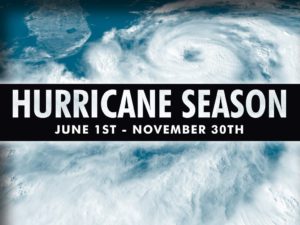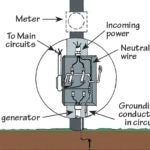
The month of June officially kicked off the summer season, but it also marks the beginning of a potentially dangerous time—hurricane season. North Carolina sits on the Atlantic coast, and hurricanes often bring flooding, power loss, and wind-damage to this area, as well as areas inland. Follow these tips to brush up on what to do before, during and after a storm to keep you safe and minimize damage to your home:
Before a Hurricane:
-
Outline a communications and evacuation plan for your family before a hurricane warning is issued to minimize confusion and fear. If you have pets or any livestock, include them in your plan.
-
Create an emergency kit that includes 72 hours’ worth of food, water, medication and any other supplies you may need.
-
Bring all lawn furniture, decorations, toys and garbage cans in from outside. Tie-down items that can’t be brought in like boats and trailers.
-
Fuel up your car. A loss of electricity could put gas stations out of commission until power is restored.
-
Close windows, doors and hurricane shutters. Plywood can be used to board up windows and doors if your house doesn’t have hurricane shutters.
-
Secure your home and evacuate immediately if you live in a mobile home or flood zone.
During a Hurricane:
-
Stay indoors and away from windows, skylights and glass doors.
-
If flooding is imminent, turn off electricity at the main breaker.
-
Listen to a battery-operated radio or TV for information about the storm and evacuation procedures.
-
Avoid using the phone except for serious emergencies.
-
Do not go outside until officials have issued an all-clear, even if the winds have subsided. You may be in the eye of the hurricane and about to face another round of high winds and heavy rain.
After a Hurricane:
-
Stay alert for extended rainfall and flooding even after the hurricane has passed.
-
Keep away from loose or dangling power lines. Report them immediately to your local co-op.
-
If power was out for an extended period of time, throw out any food that may have spoiled in the refrigerator.
-
Take pictures of any damage that has occurred to your home for insurance purposes.
-
If running a generator, place it in a dry, well-ventilated area away from air intakes into the home. The generator should be properly grounded and connected to appliances with proper power cords.
-
Report power outages to your local electric cooperative.
Important Information to Remember:
-
Memorize Lumbee River EMC’s telephone numbers (910) 843-4131 or (800) 683-5571
-
-
when reporting an outage select option 1 then option 3
-
be sure your account(s) have the correct phone number
-
have your account number available
-
-
-
All outages should be reported through the outage management system to ensure proper handling.
-
With high call volumes and wait times we may not be able to answer your call, we assure you that our outage management system is designed to get your call and get you on the restoration list promptly without speaking to a representative.
-
To view outage information in your area, please view Lumbee River EMC’s Outage Map at https://outages.lumbeeriver.com/
-
Check our website and social media sites for updates when available
-
Members with electric-powered medical equipment or medical issues, in general, should note that power outages can last for multiple days, please have a backup plan in place to move if necessary
-
Members with critical electrical load should also have a backup plan in place for service
Preparing for hurricane season will help you stay safe, potentially saving lives and money. You cannot prevent hurricanes, but you can minimize damage to your home and injury to your family by gathering supplies, preparing your home and planning for a possible storm before the hurricane season starts.
Here at Lumbee River EMC, it is our priority to work as safely and quickly as possible to restore your power!
Click the following links for additional resources:
Preventing Electrocutions Associated with Portable Generators Plugged Into Household Circuits
When power lines are down, residents can restore energy to their homes or other structures by using another power source such as a portable generator. But if used improperly it can kill you and the people who are restoring power to your building. A generator also can damage the appliances you connect.
Home emergency generators are usually powered by gasoline, which itself is dangerous and must be properly handled outdoors.
Generator sizes vary. Units capable of handling from 3,000 to 6,000 watts (including starting surge requirements) can power multiple “survival” appliances such as a refrigerator, sump pump, and furnace fan. Units putting out 7,000 to 9,000 watts can power a few rooms (not including a central air conditioner). The bigger generators for 10,000 watts or more can power a small house.
Before connecting the generator to your household circuit, notify your electric cooperative.
WARNING:
If you connect a portable electric generator to the main electrical supply coming into the house, the electrical generator could feed back into your electric cooperative’s system and electrocute workers who are repairing the electrical lines.
To avoid the back-feeding of electricity into utility systems, you must have a qualified, licensed electrician install a double-pole, double-throw transfer switch (see illustration) between the generator and utility power in compliance with all state and local electrical codes. (A minimum of 10-gauge wiring must be used.)
Your generator might not be large enough to handle a load of all the lights, appliances, TV, etc., at one time. To prevent dangerous overloading, refer to the owner’s manual and calculate wattage requirements correctly.

Use the right size generator
To determine the size you’ll need, make a list of appliances you want to run in the event of an outage. Find both starting and running wattage requirements on appliance nameplates or in the owner’s manuals; then add them up to determine the total wattage. Although the starting wattage will last for only a few seconds, the generator must be able to meet it to run safely. Once you have a total, scale the generator up a size or two to ensure safe, efficient operation.
Sources: North Carolina Association of Electric Cooperatives; National Rural Electric Cooperative Association
Accidentally contacting a power line can be dangerous and in some cases, even deadly. Your Touchstone Energy cooperative wants to help our members stay safe around power lines. KEEP A SAFE DISTANCE Whether you are playing outdoors with your children or working on landscaping projects, keep a safe distance from power lines and other equipment your co-op uses to get electricity to your home. Always remember to:
-
Stay away from power lines, meters, transformers, and electrical boxes.
-
Don’t climb trees near power lines.
-
Never fly kits, remote control airplanes or balloons near power lines.
-
If you get something stuck in a power line, call your Touchstone Energy co-op to get it.
-
Keep a safe distance from overhead power lines when working with ladders or installing objects such as antennas.
-
Never touch or go near a downed power line.
-
Don’t touch anything that may be touching a downed wire, such as a car.
-
Keep children and pets away.
If a power line falls on a car, you should stay inside the vehicle. This is the safest place to stay. Warn people not to touch the car or the line. Call or ask someone to call the local cooperative and emergency services. The only circumstance in which you should consider leaving a car that is in contact with a downed power line is if the vehicle catches on fire. Open the door. Do not step out of the car. You may receive a shock. Instead, jump free of the car so that your body clears the vehicle before touching the ground. Once you clear the car, shuffle at least 50 feet away, with both feet on the ground. As in all power line related emergencies, call for help immediately by dialing 911 or call your electric utility company’s Service Center/Dispatch Office. Do not try to help someone else from the car while you are standing on the ground.
